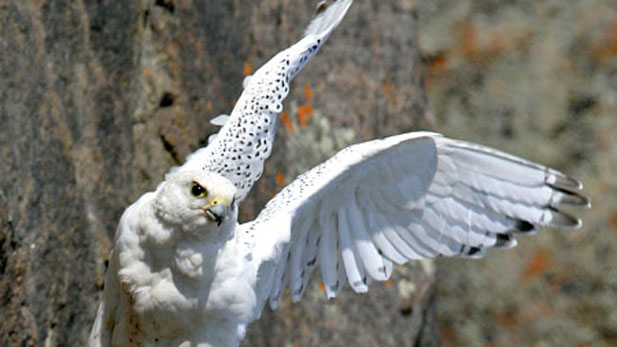
A pair of snowy white gyrfalcons and a pack of Arctic wolves must work hard to raise their families during the brief respite the sun provides. By the end of August, their jobs as parents must be complete, their young ready to take on the return of the snows.
The gyrfalcons hatch early in the season when young Arctic hares, called leverets, are still small and plentiful. The chicks must be constantly fed, and the female must stay at the nest to feed and protect them while the male hunts. He must take full advantage of this time because the leverets will soon be too big for him to carry back to the nest. If he should fail to provide enough food, the chicks won’t survive. When the father slacks off in his hunting responsibilities, the mother must take matters into her own talons; drama ensues.
The Arctic wolves have waited with great anticipation for a sign that new pups have been born to their breeding female, who has spent a great deal of time in her den. But this year there will be no pups, and the pack spends the summer on the move, with one youngster from last year’s litter remaining very much the carefree baby. The eight wolves in the pack travel up to 50 miles a day looking for prey, but the yearling is easily distracted and finds it hard to keep up with the pack. Alone, she has little idea about where and how to find food, and her solo adventures put her at considerable risk. But she faces her world of wonder with curiosity and determination that will serve her well. Eventually, she reunites with the pack, a valuable lesson in responsibility learned.
The NATURE Web site pbs.org/nature features video podcasts (also available on iTunes), behind-the-scenes interviews with filmmakers and producers, program excerpts and outtakes.
Watch it Saturday, November 1st 11:00 p.m. on PBS-WORLD

By submitting your comments, you hereby give AZPM the right to post your comments and potentially use them in any other form of media operated by this institution.